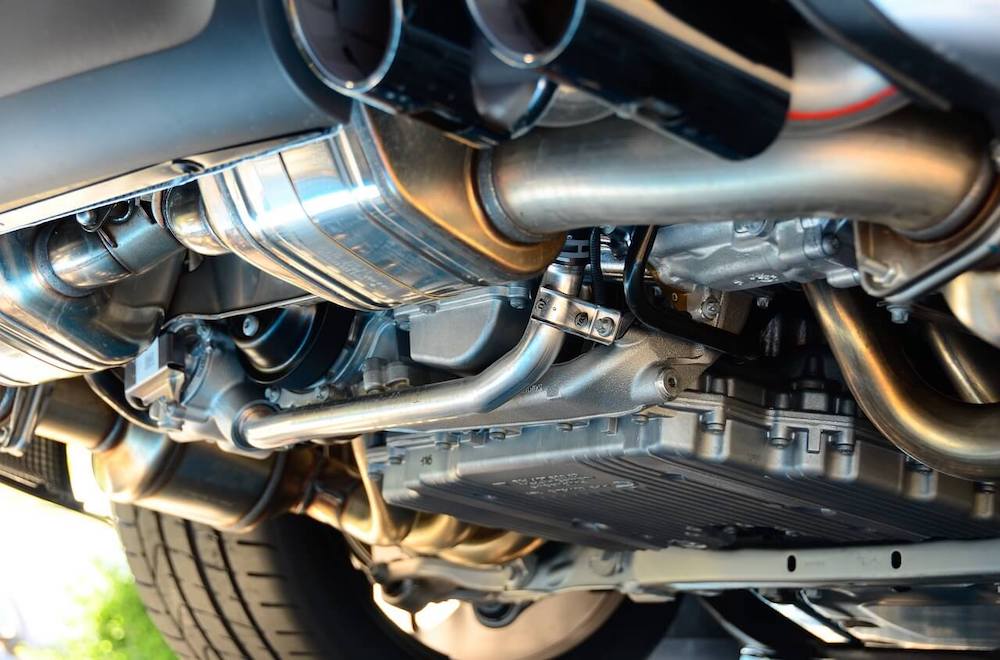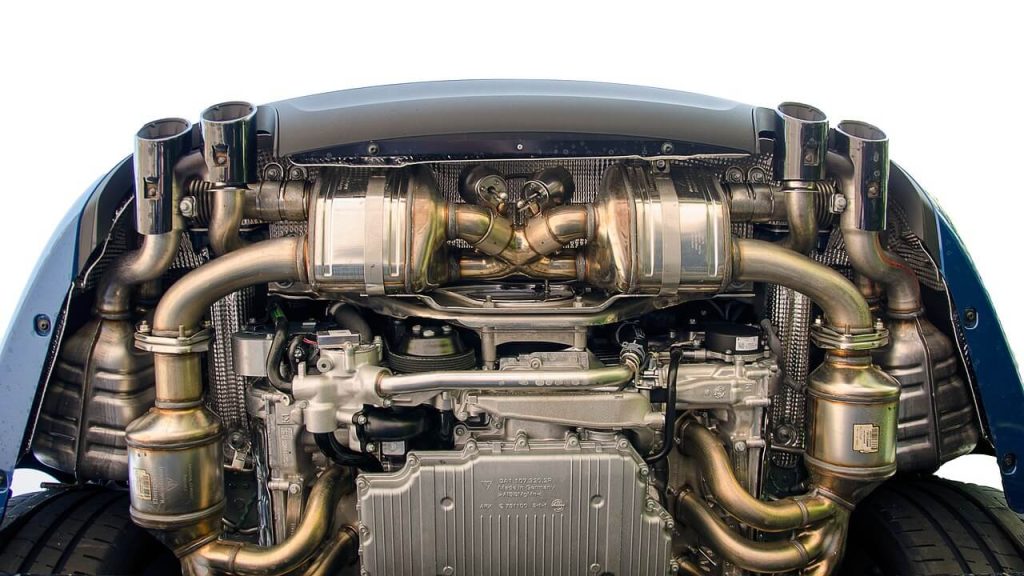Last Updated on July 22, 2023 by Mark S. Taylor
Contents [hide]
Why Should Your Exhaust System Be Clean?
Cleaning your exhaust system has the following advantages:
• Better Engine Performance: A clean exhaust system promotes a smoother airflow, which lowers back pressure and enhances engine performance.
• Reduced Emissions: Cleaning the exhaust system of carbon buildup and soot helps reduce hazardous emissions and promotes a cleaner environment.
• Increased Durability: Maintaining your exhaust system’s cleanliness helps to keep corrosive materials from building up and shortening its lifespan.

Knowledge About Your Exhaust System
Understanding the parts of your exhaust system is crucial before starting the cleaning process. The standard exhaust system is made up of various components, such as:
Exhaust manifold or header
The header or exhaust manifold gathers the engine’s cylinders’ exhaust gases and directs them into the exhaust pipe.
Converter Catalytic
The catalytic converter is in charge of lowering harmful emissions by chemically transforming poisonous gases into less damaging compounds.
Muffler
As exhaust gases leave the car, the muffler lessens the noise they make. It has chambers and baffles that aid in absorbing sound.
Intake Pipe
The exhaust pipe transports the engine’s exhaust gases to the back of the car, where they are let go into the atmosphere.
Safety Measures
It’s crucial to observe the following safety precautions before cleaning your exhaust system:
• Cool Down the Exhaust: To prevent burns, make sure the exhaust system has completely cooled down before beginning any cleaning activities.
• Work in a Well-Ventilated Space: Since fumes can be released during the cleaning of exhaust components, it is recommended to do it in an open or well-ventilated area to prevent inhalation.
• Don protective equipment: To protect yourself from chemicals, debris, and fumes, put on gloves, safety glasses, and a dust mask.
You Will Need These Tools and Materials
Before beginning to clean your exhaust system, gather the necessary tools and supplies:
• Degreaser or All-Purpose Cleaner: Select a cleaner appropriate for the material of your exhaust system (stainless steel, chrome, etc.).
• Soft Bristle Brush: To prevent harming your exhaust system’s surface, use a brush with soft bristles.
• Microfiber cloth or sponge: These can be used to remove filth and dirt without inflicting any harm.
• Water Hose or Bucket: Water is necessary for both rinsing and dilution of the cleaning.
• Chrome or Metal Polish (Optional): Polish helps bring back the shine to your exhaust system’s chrome or metal highlights.
Cleaning the Exhaust System’s Exterior
To clean the outside of your exhaust system, take the following actions:
Step 1: Prepare the degreaser or all-purpose cleaner by mixing it with water as directed by the manufacturer.
Step 2: Completely cover the outer surface of the exhaust system with the cleaning solution.
Step 3: Let the cleaner sit for a while so that the filth and grime can be broken down.
Step 4: To get rid of tough deposits, gently scrape the external surface with a soft bristle brush. Pay close attention to regions where carbon has accumulated heavily.
Step 5: Thoroughly rinse the exhaust system with water to get rid of the cleaning agent.
Step 6: Use a microfiber towel or sponge to dry the exhaust system, making sure there are no water stains left behind.
Step 7: If desired, follow the manufacturer’s directions when polishing any chrome or metal accents on your exhaust system.
Cleaning the Exhaust System’s Interior
A different strategy is needed to clean the exhaust system’s interior. Take these actions:
First, turn on the engine of your car and let it run for a while. The carbon buildup inside the exhaust system will be helped to dissolve by the heat.
Step 2: Shut off the engine and give it a moment to cool.
Step 3: Thoroughly examine the muffler and exhaust pipe. It could be important to seek professional help if you discover considerable carbon buildup or obstructions.
A long, flexible brush or pipe cleaner should be inserted into the exhaust pipe as the fourth step. Scrub the interior gently, sweeping the brush back and forth to remove any carbon buildup.
Step 5: Clean the exhaust pipe and muffler of any loose particles using compressed air or a vacuum.
Step 6: Carry out this procedure for each muffler and exhaust pipe linked to your car.

Tips for Keeping an Exhaust System Clean
Take into account the following advice to maintain your exhaust system in top condition:
• Regular Cleaning: Depending on your driving circumstances, you should clean your exhaust system at least once every three months.
• Avoid Harsh Chemicals: To minimize finish damage, use cleaners made exclusively for exhaust systems.
• Check for Leaks: Frequently look for cracks, leaks, or loose connections in your exhaust system. Any problems should be resolved right away to avoid future harm.
• Avoid Excessive Revving: Unnecessary revving can cause carbon and soot deposits to accumulate. Avoid prolonged idling and accelerate smoothly.
• Protective Coating: To ward off corrosion and preserve a cleaner appearance, think about coating your high-temperature exhaust system.
Why it’s Important to Remove Carbon Buildup from the Exhaust
A buildup of carbon in the exhaust system might have the following detrimental effects:
Excessive carbon buildup may restrict the flow of exhaust gases, which would raise the engine’s backpressure. Engine efficiency and performance may suffer as a result.
Engine misfires can be brought on by carbon buildup because it interferes with the normal combustion process. This can result in choppy idling, less power, and more fuel use.
Increased Emissions: Harmful pollutants such carbon monoxide (CO), nitrogen oxides (NOx), and hydrocarbons (HC) may be released at increased rates as a result of a dirty exhaust system. This may result in pollution of the environment and make your car fail emissions tests.
How to Clean Your Exhaust of Carbon Buildup
Consider using one of the following techniques to efficiently eliminate carbon buildup from your vehicle’s exhaust system:
There are several different carbon cleaning products on the market that can dissolve and get rid of carbon deposits. For safe and efficient use, adhere to the manufacturer’s instructions.
Mechanical Cleaning: In some circumstances, it could be essential to manually clean the exhaust’s parts, including the catalytic converter, muffler, and pipes. To remove carbon buildup, this may entail utilizing wire brushes, scrapers, or specialized instruments. It’s crucial to use caution and keep the components intact.
Read More: How To Make Flames Come Out Of Exhaust
Tips for Maintaining Clean Car Exhaust
Maintaining your car’s exhaust system on a regular basis can assist prevent excessive carbon buildup and guarantee peak performance:
Examine the Exhaust System: Continually look for symptoms of wear, leaks, or loose connections in the exhaust system. Any problems should be resolved right away to avoid future harm.
Regularly Clean the Exhaust Tips: The exhaust tips are prone to carbon buildup, which can have an impact on your vehicle’s overall appearance. They can be cleaned frequently with a gentle cloth or sponge, water, and light soap.
Check and Replace Filters: If your car has an exhaust system with an air filter or a particulate filter, be sure to check and replace them in accordance with the manufacturer’s instructions. Carbon accumulation may be facilitated by clogged filters.
Use High-Quality gasoline: When combined with the right additives, high-quality gasoline can help prevent carbon buildup in the engine’s cylinder walls and lower the amount of carbon that accumulates in the exhaust system.
Advice for Preventing Carbon Buildup
Avoiding carbon buildup in the exhaust system will spare you the trouble of laborious cleaning and possible harm.
Regular Maintenance: Replace air filters, spark plugs, and other parts of your car according to the maintenance schedule that is advised for it. Regular maintenance encourages effective combustion and lowers the production of carbon.
Avoid short excursions since they can result in incomplete combustion and carbon buildup due to frequent engine starts and stops. To reduce carbon emissions, combine brief excursions wherever you can or use an alternative mode of transportation.
Fuel Additives: Take into account utilizing fuel additives made to clean the combustion chambers and fuel system. These additives can assist in lowering carbon buildup and maintaining a cleaner exhaust system.
Avoid Driving Aggressively: Driving aggressively can cause carbon to accumulate more quickly in the exhaust system. Examples of this include strong acceleration and braking. To reduce carbon deposits, keep your driving style steady and smooth.
For maximum efficiency and durability, your exhaust system has to be cleaned frequently both inside and out. You may guarantee a clean and effective exhaust system for your car by following the step-by-step instructions offered in this article and implementing proper maintenance methods.
How often should I clean my exhaust system?
Depending on your driving habits and the buildup of dirt and grime, it is advised to clean your exhaust system every three months or as necessary.
Can I clean my exhaust system with any cleaner?
The ideal cleaning solution to use on exhaust systems is a degreaser or all-purpose cleaner. Take care not to use harsh chemicals that could harm the finish.
Is it required to clean the exhaust system’s interior?
It is advised to clean the exhaust system’s interior to get rid of carbon buildup and make sure the airflow is adequate. However, extra care must be taken, and it could be wise to hire a pro to perform a thorough cleaning.
Can my exhaust system be cleaned while it’s hot?
No, in order to avoid burns, you must wait until your exhaust system has cooled completely before attempting to clean it.
Can my exhaust system be cleaned to increase fuel economy?
While maintaining a clean exhaust system helps the engine run at its best, fuel economy may not be significantly affected. The effectiveness of maintenance and driving techniques, for example, contribute more to fuel economy.
